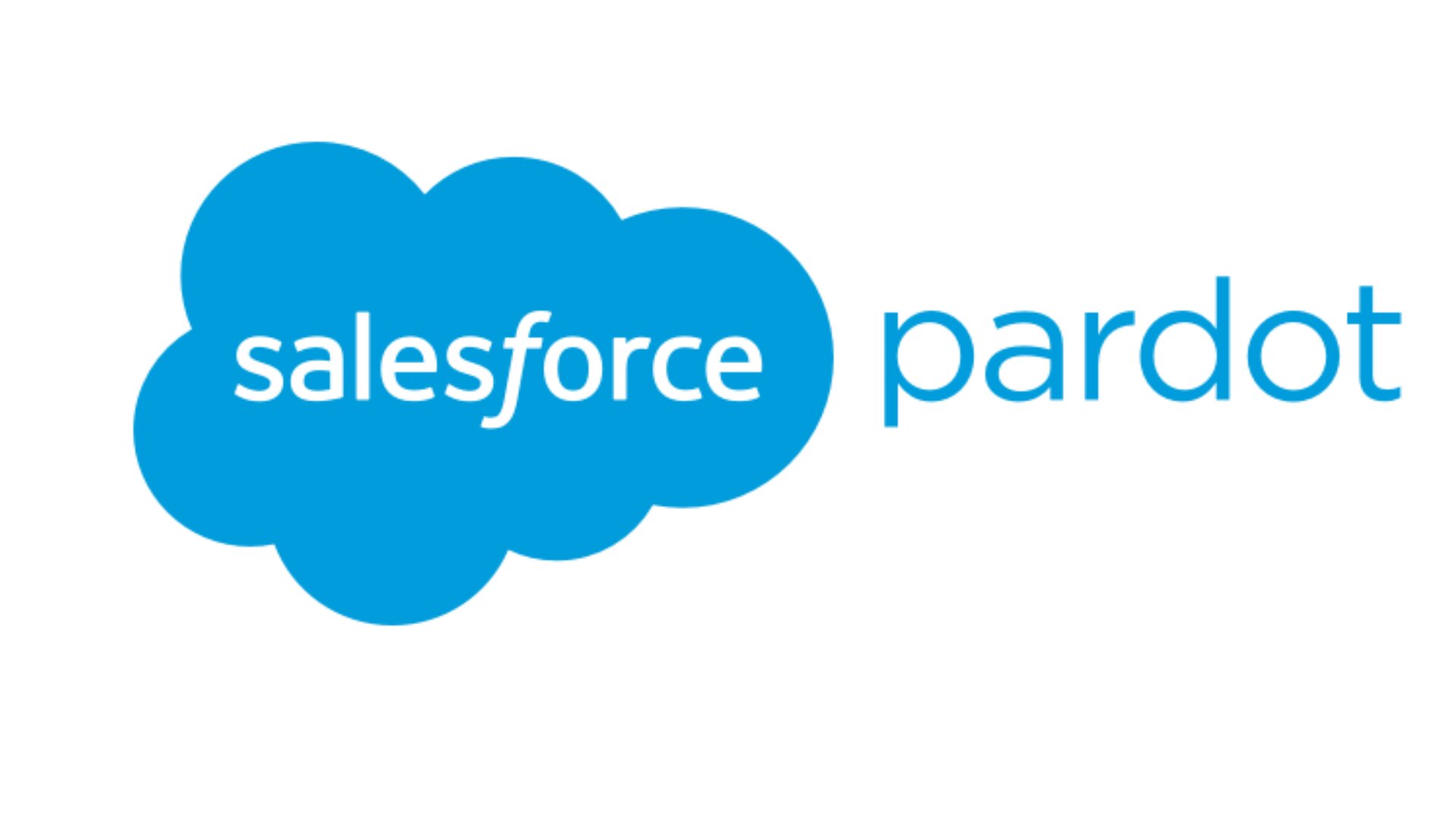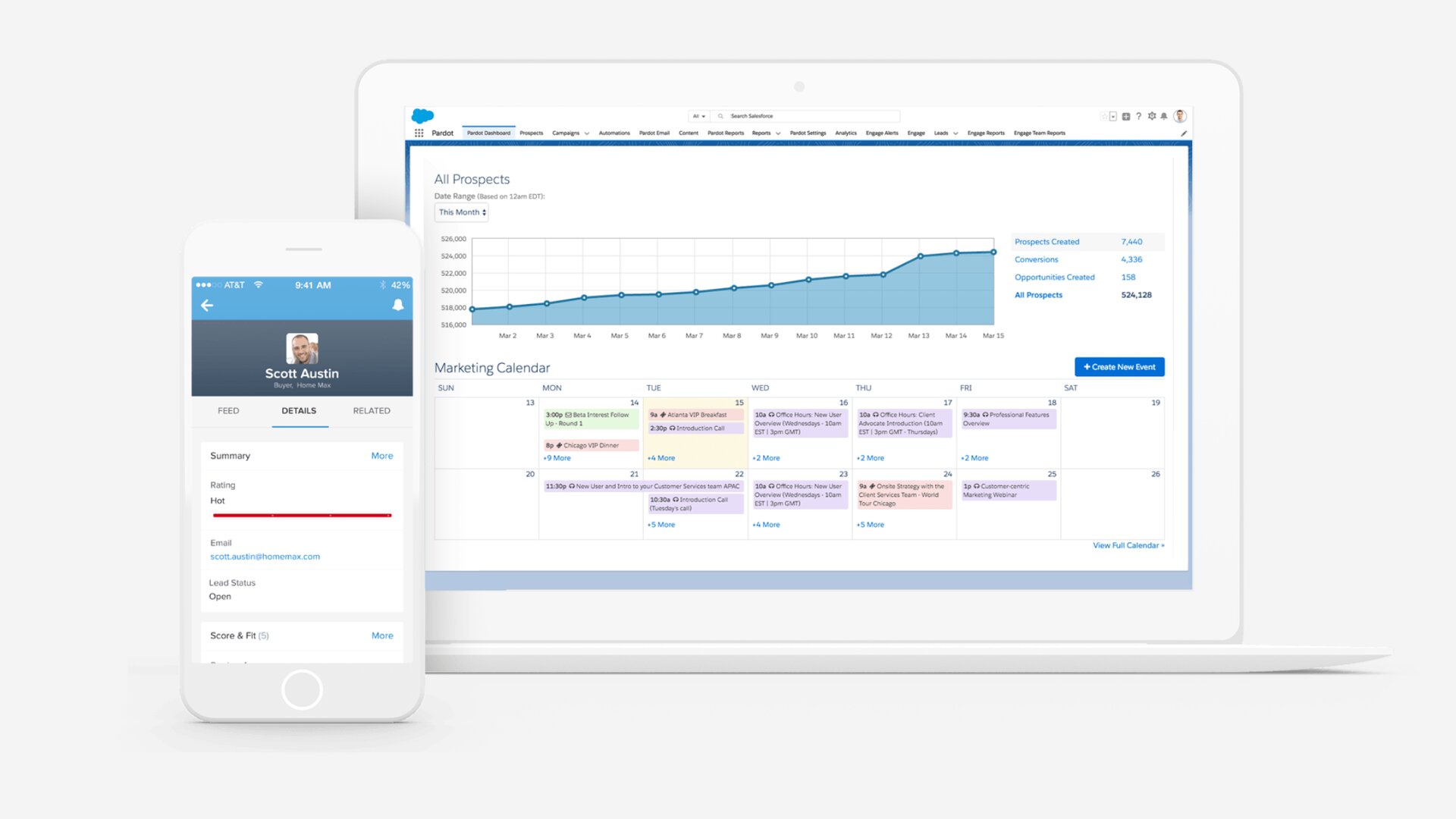What is Salesforce Pardot?
Powerful, easy-to-use marketing tools for medium and large businesses

What is Salesforce Pardot?
Salesforce Pardot is a comprehensive marketing automation solution ideal for businesses and enterprises. It integrates with Salesforce Sales Cloud, one of the best CRM software platforms on the market, to help businesses organize, analyze, automate and measure the effectiveness of sales and marketing campaigns.
What does Salesforce Pardot do?
- Generates new leads for your business. Pardot helps you build new leads with custom landing pages, web forms, and email marketing campaigns.
- Tracks potential customers across your digital properties. The software tracks visitors to your website or landing pages and provides a log of all their activity. It also syncs that information with your CRM for easy reference during interactions.
- Provides personalized customer experiences through automation. Pardot offers automated workflows that you can use to reach out to leads based on their activity or segment leads for marketing campaigns.
- Automates lead scoring. Pardot’s automated workflows also enable you to automatically score leads based on their online activity, making it easier to focus your efforts on the visitors who are most likely to convert.
- Tracks the performance of your marketing efforts. Pardot offers an overview of how visitors are moving through your sales pipeline, whether your email marketing campaigns are driving sales, and whether you’re seeing a return on investment from search engine marketing.

How departments can use Salesforce Pardot
Marketing
Salesforce Pardot is designed to be an all-in-one platform for online marketing. The platform enables marketers to quickly assemble custom landing pages and web forms to generate leads and gather information about them. From there, marketers can use Pardot to see how leads move through their website to get a better idea of what products, offers, or information might push them towards conversion.
Pardot also makes it easy to create and automate email campaigns. The platform includes a drag-and-drop email builder with plenty of templates to get you started. Pardot offers many different ways to segment your lead and customer databases and supports A/B testing to hone your message to different groups. You can also add personalized form fields to make sure your campaigns resonate.

In addition, Pardot offers tools for teams to improve their search engine marketing efforts. Marketing teams can quickly analyze which keywords are driving traffic in both paid and organic searches. The software also integrates with Google AdWords to track cost-per-click.
Sales
Salesforce Pardot integrates seamlessly with Salesforce Sales Cloud and provides a number of supplementary tools for sales teams. A comprehensive engagement history shows all the interactions leads and customers have had with a business’s digital properties in between sales calls. Sales teams can also see new leads’ engagement history with their company’s website or landing pages. So, employees can come to a sales call prepared with exactly the right pitch for that customer.
Another capability that Pardot offers sales teams is the ability to send out small-scale email marketing campaigns to an individual sales rep’s customers. These marketing campaigns can be customized with an employee’s email signature. Plus, all customer interactions with these campaigns are saved to the engagement history, providing more feedback for the next sales call.
Sign up for breaking news, reviews, opinion, top tech deals, and more.
Features and benefits of Salesforce Pardot
Integration with Salesforce Sales Cloud
Pardot integrates seamlessly with the Salesforce Sales Cloud CRM. That makes it easy to combine marketing and sales data, enabling managers to see the return on investment their business is getting from marketing efforts. The integration also means that lead engagement history data from Pardot is available in Sales Cloud. So, sales employees don’t need to alter their existing workflows.
Artificial intelligence
Pardot Einstein uses machine learning to automatically score leads based on the profiles generated from company web forms. The algorithm also provides behavior scoring based on the leads’ online activity, giving sales employees an indication of when a lead is close to conversion.
Real-time interaction alerts
Pardot offers real-time desktop, mobile, and email alerts when a lead or existing customer interacts with a business’s digital properties. That, combined with behavior scoring from Pardot Einstein, makes it easier for sales teams to know when to reach out to customers to drive home a sale.
Progressive lead profiling
Pardot uses a technique known as progressive profiling to build information about new leads. Instead of asking visitors to a landing page to enter a lot of information at once, the system enables teams to design brief interactions that each yield an additional detail about the lead. This results in higher conversion rates and more detailed lead profiles. A drag-and-drop web form builder makes it easy to design incremental questions and tasks for leads.
Personalized customer experiences
Pardot offers automated workflows that businesses can use to build personalized customer experiences. The platform comes with templates to re-activate cold leads and display targeted offers. Sales and marketing teams can also use workflows to automatically assign, segment, and score leads. Pardot offers a visual workflow editor that makes it relatively straightforward to build and edit complex automations.

How much does Salesforce Pardot cost?
Salesforce Pardot starts at $1,250 per month for the basic Growth plan. While that’s very expensive compared to other marketing platforms, the price is justified by the fact that few platforms offer Pardot’s level of versatility Pardot. However, the high sticker price also means that Pardot may not be worthwhile for small businesses with only a handful of marketers.
The Growth plan comes with a few limitations. It doesn’t offer API access, custom user roles, or multiple lead scoring categories, and you’re limited to 50 automation rules. The Plus plan, for $2,500 per month, adds these features and allows up to 100 automation rules.
The Advanced plan, which costs $4,000 per month, includes AI features for predictive lead scoring as well as online monitoring of up to 100 competitors. The Premium plan, designed for enterprise-scale businesses, costs $15,000 per month and enables you to deploy separate Pardot environments across up to five business units.
Salesforce Pardot FAQs
What is the difference between Salesforce Sales Cloud and Pardot?
Salesforce Sales Cloud is a CRM software designed to help sales teams assemble leads and track interactions between customers and sales teams. Salesforce Pardot is a marketing-focused platform that helps teams build landing pages and email campaigns, supports personalized customer experiences online, and tracks the performance of search engine marketing efforts.
How do I connect Pardot to Salesforce?
You can integrate Pardot to the Salesforce Sales Cloud CRM using a connector available in the Salesforce AppExchange. You must first install the connector in Sales Cloud, then link it in Pardot using the platform’s remote site settings. By default, the two platforms share lead profiles, but you can also configure the connector to share custom fields created in Pardot.
What is Pardot Einstein?
Pardot Einstein is a machine learning algorithm available with Advanced and Premium Pardot subscriptions. This algorithm uses lead profile data to automatically score your leads. It also uses online engagement data to predict when a lead is getting ready to make a purchase. Einstein can be used with real-time activity alerts to help sales teams know when to engage with customers.
What is Salesforce Engage?
Salesforce Engage is an add-on for Pardot that costs $50 per user per month. Engage makes it easier to share data from marketers using Pardot with sales employees using Salesforce Sales Cloud. The main thing Engage offers is lead filtering: sales teams can filter leads by their online engagement history, geography, or other data captured in Pardot. Engage also makes leads’ online activity, which is tracked by Pardot, available to view in Salesforce Sales Cloud.
Is Salesforce Pardot easy to use?
Salesforce Pardot offers very powerful tools for marketers and sales teams, but it’s also quite easy to use. You can create landing pages and web forms using drag-and-drop builders, and there’s a visual editor for building automated workflows. Pardot also comes with templates for email campaigns and reports. The only thing that can be tricky about Pardot is configuring integrations with Salesforce Sales Cloud, which requires a deep dive into the settings menu.
Main takeaways
- Salesforce Pardot is an automation-focused marketing platform that helps you generate and manage leads as well as share data between your marketing and sales teams.
- Pardot makes it easy to create landing pages, web forms, and email marketing campaigns with drag-and-drop builders, and offers options for personalized customer experiences across these properties.
- Pardot tracks all interactions with your company’s digital properties and integrates with Salesforce Sales Cloud to make that data available to your sales team.
- Pardot uses artificial intelligence to automatically score leads and their behavior, providing actionable information to your sales team about when a lead is ready to convert.
- Pardot helps managers analyze the return on investment your business is getting from your marketing efforts by combining sales and marketing data and integrating with Google AdWords.
Further reading
Check out our guide to Salesforce to learn more about this business software giant. We’ve also rounded up the best CRM for small business and the best lead generation tools. For more about marketing options, check out our guide to the best online marketing services.
Michael Graw is a freelance journalist and photographer based in Bellingham, Washington. His interests span a wide range from business technology to finance to creative media, with a focus on new technology and emerging trends. Michael's work has been published in TechRadar, Tom's Guide, Business Insider, Fast Company, Salon, and Harvard Business Review.
